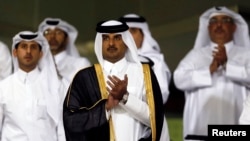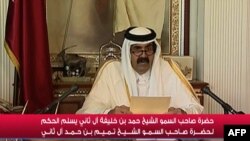Qatar's ruler handed power Tuesday to his son in a carefully managed transition. The move puts a new generation in charge of a key U.S. ally that has pursued a high-profile, interventionist policy that funds Islamists throughout the region and is controversial in the West.
In a rare abdication by a hereditary Gulf Arab ruler, the 61-year-old emir, Sheikh Hamad bin Khalifa al-Thani, handed power to his son, 33-year-old Crown Prince Sheikh Tamim, to try to ensure a smooth succession.
The new emir, who will become the youngest ruler in the Gulf, will deliver a speech to the nation Wednesday, after which he will choose a new government.
Qatar has vast energy wealth and the highest per-capita income in the world. The situation allows the tiny emirate to simultaneously support the Arab Spring uprisings as well as generous social programs that help it avoid domestic criticism and remain an absolutist monarchy.
Assertive interventionism
The country also hosts the largest U.S. military base in the Middle East. According to University of Vermont scholar Gregory Gause, that has freed Qatar to take an aggressive foreign policy stance and avoid pushback from the West and nervous Gulf neighbors.
"Qatar has cooperated with the United States on a lot of things, but it made a strategic choice under [the outgoing] emir that it thought the Islamists - particularly Sunni Islamists - were the wave of the future in the Middle East and it developed very close relations with the Muslim Brotherhood and other Islamist groups, including Hamas. That has given Washington some amount of heartburn," said Gause.
Qatar has broken ranks with other Gulf states and established strong ties with Egypt's ruling Muslim Brotherhood movement. It has mediated a number of crises and wars, including Sudan's Darfur, Palestinian politics, Yemen and Lebanon.
In recent days it allowed the Afghan Taliban open an office in Doha.
Qatar also financed the rebels who toppled and killed Libyan leader Moammar Gadhafi in 2011 and continues to fund Sunnis fighting to oust Syrian President Bashar al-Assad.
While Qatar's Libyan intervention meshed with U.S. goals, its actions in Syria are far murkier for Washington.
"While there's always some overlap, because you have various groups in Syria who are selling themselves to all sorts of foreign patrons - because they need the ammunition, the weapons and the money - they might be telling different audiences different things," said Gause, who is affiliated with the Brookings Institution Doha offices.
"Its pretty clear to me the U.S. was not pleased with some of the groups Qatar has supported, he said.
Qatar's elevated influence
Sheikh Hamad has further spread the Gulf nation's outsized influence since he founded the powerful Al Jazeera satellite television network in the 1990s and helped Qatar win a surprising bid to host football's (soccer's) World Cup in 2022.
The outgoing emir has a history of innovative thinking.
"Qatar has been taking a leading role in foreign policy issues, as far as the Gulf is concerned, over the past years, always surprising people as far as the positions it takes, and here we see somewhat of a surprise on the domestic front," said Christian Koch, who directs the Geneva-based Gulf Research Center.
Gulf analysts say Qatar's veteran prime minister and foreign minister, Sheikh Hamad bin Jassim - the public face of the emirate's assertive foreign policy - is likely to follow the emir and resign. But most observers expect no significant changes to the Gulf nation's taste for strategic intervention.
The Qataris will likely continue to use their great wealth in the short term to "punch above their weight," Gause said.
In a rare abdication by a hereditary Gulf Arab ruler, the 61-year-old emir, Sheikh Hamad bin Khalifa al-Thani, handed power to his son, 33-year-old Crown Prince Sheikh Tamim, to try to ensure a smooth succession.
The new emir, who will become the youngest ruler in the Gulf, will deliver a speech to the nation Wednesday, after which he will choose a new government.
Qatar has vast energy wealth and the highest per-capita income in the world. The situation allows the tiny emirate to simultaneously support the Arab Spring uprisings as well as generous social programs that help it avoid domestic criticism and remain an absolutist monarchy.
Assertive interventionism
The country also hosts the largest U.S. military base in the Middle East. According to University of Vermont scholar Gregory Gause, that has freed Qatar to take an aggressive foreign policy stance and avoid pushback from the West and nervous Gulf neighbors.
"Qatar has cooperated with the United States on a lot of things, but it made a strategic choice under [the outgoing] emir that it thought the Islamists - particularly Sunni Islamists - were the wave of the future in the Middle East and it developed very close relations with the Muslim Brotherhood and other Islamist groups, including Hamas. That has given Washington some amount of heartburn," said Gause.
Qatar has broken ranks with other Gulf states and established strong ties with Egypt's ruling Muslim Brotherhood movement. It has mediated a number of crises and wars, including Sudan's Darfur, Palestinian politics, Yemen and Lebanon.
In recent days it allowed the Afghan Taliban open an office in Doha.
Qatar also financed the rebels who toppled and killed Libyan leader Moammar Gadhafi in 2011 and continues to fund Sunnis fighting to oust Syrian President Bashar al-Assad.
While Qatar's Libyan intervention meshed with U.S. goals, its actions in Syria are far murkier for Washington.
"While there's always some overlap, because you have various groups in Syria who are selling themselves to all sorts of foreign patrons - because they need the ammunition, the weapons and the money - they might be telling different audiences different things," said Gause, who is affiliated with the Brookings Institution Doha offices.
"Its pretty clear to me the U.S. was not pleased with some of the groups Qatar has supported, he said.
Qatar's elevated influence
Sheikh Hamad has further spread the Gulf nation's outsized influence since he founded the powerful Al Jazeera satellite television network in the 1990s and helped Qatar win a surprising bid to host football's (soccer's) World Cup in 2022.
The outgoing emir has a history of innovative thinking.
"Qatar has been taking a leading role in foreign policy issues, as far as the Gulf is concerned, over the past years, always surprising people as far as the positions it takes, and here we see somewhat of a surprise on the domestic front," said Christian Koch, who directs the Geneva-based Gulf Research Center.
Gulf analysts say Qatar's veteran prime minister and foreign minister, Sheikh Hamad bin Jassim - the public face of the emirate's assertive foreign policy - is likely to follow the emir and resign. But most observers expect no significant changes to the Gulf nation's taste for strategic intervention.
The Qataris will likely continue to use their great wealth in the short term to "punch above their weight," Gause said.






